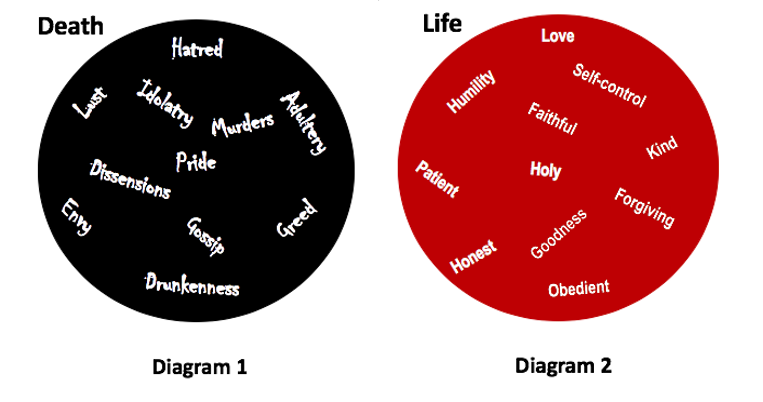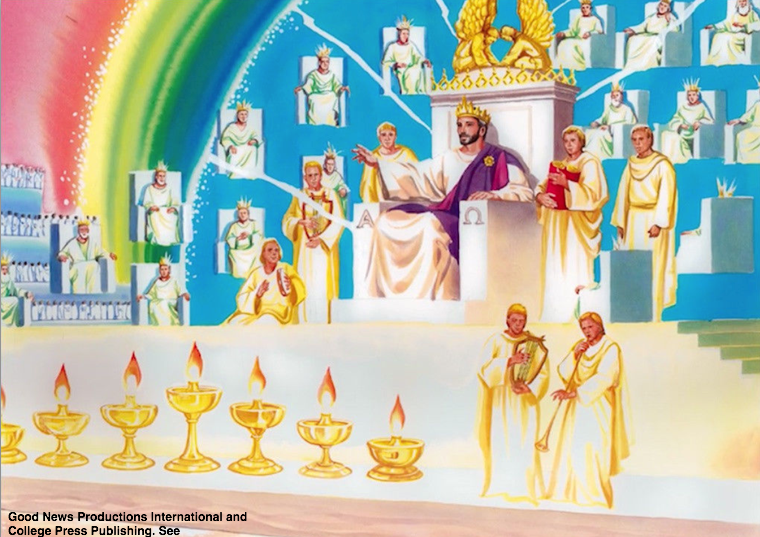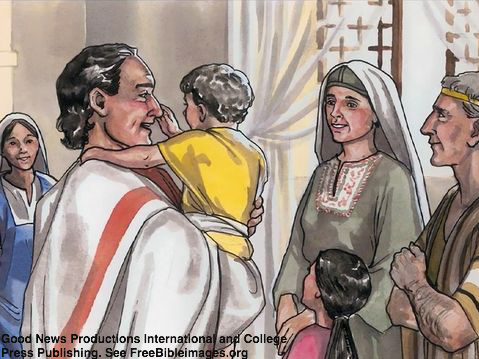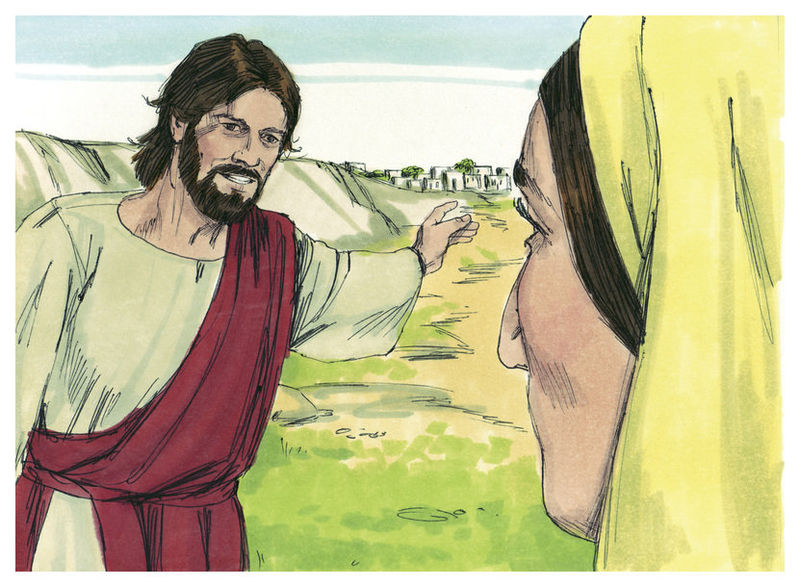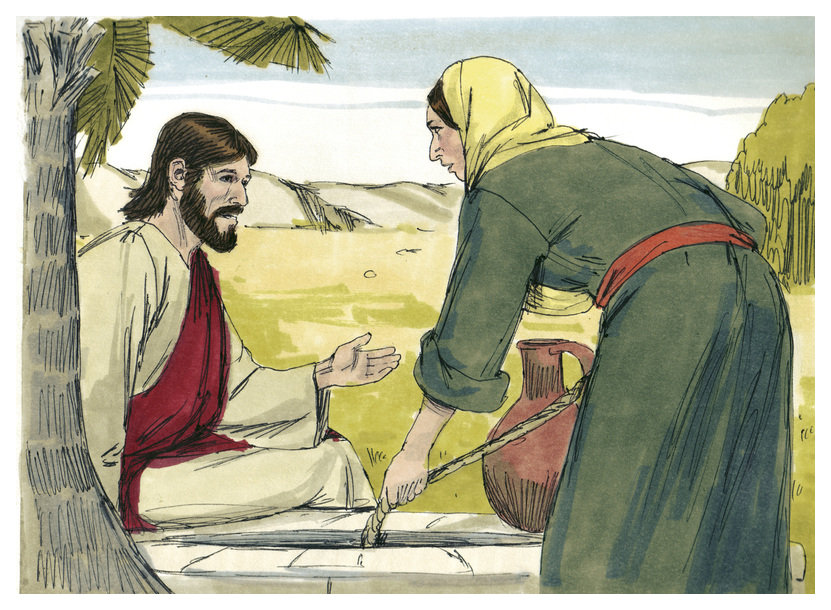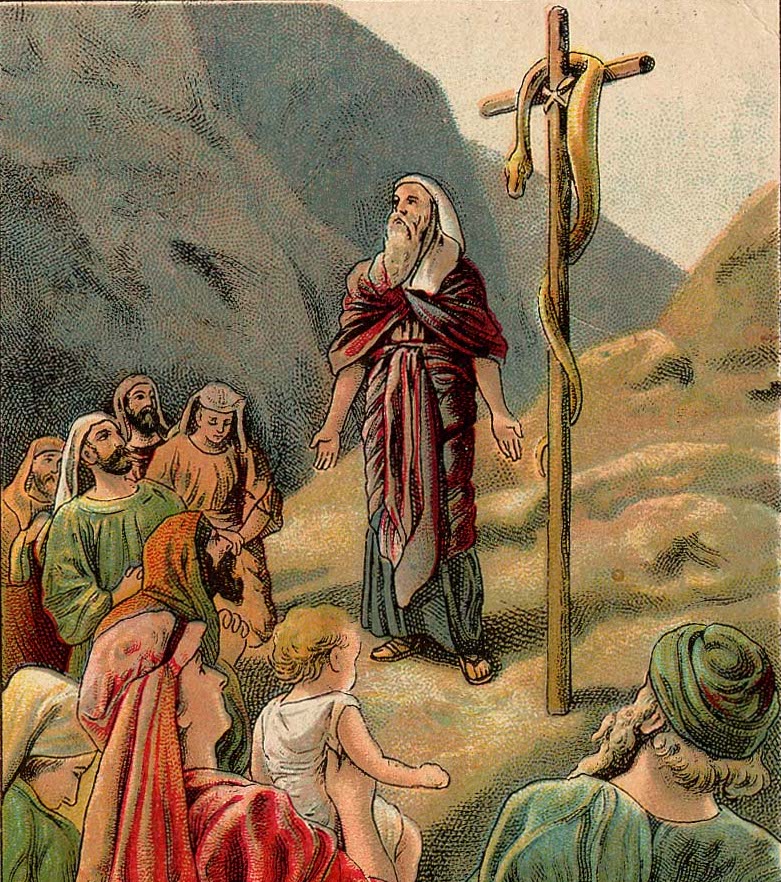“He who
believes in Him is not condemned; but he who does not believe is condemned
already, because he has not believed in the name of the only begotten Son of
God.” John 3:18
As I have
shared the gospel with others one of the disturbing questions among
non-Christians is how can a loving God send anyone to hell? To many
people this seems like a major contradiction. One minute, preachers will talk
about God’s love and forgiveness. Then they turn around and talk about hell – a
terrible place of torment and unending fire where people want to die but they
are unable to. How can God claim to be loving and forgiving and then turn
around and send someone to such a terrible place of agony and suffering?
How do you respond to this question? Let’s look in our Bibles at John
3:16-21 where Jesus is having a conversation with a religious leader named
Nicodemus. We have been doing a verse-by-verse study of the gospel of John.
This book helps us see the major emphasis of Jesus’ ministry. While Christ was
on earth, He was not scaring people out of going to hell with bad news;
instead, He was inviting people to heaven with good news. Jesus spoke
more about hell more than anyone else in the Bible, but that was not the major
emphasis of His ministry. He did not earn His reputation as a “friend
of sinners” (Matthew 11:19) by being harsh. He earned it by
being loving and kind and extending His love and forgiveness to people like all
of us. Jesus’ message and ministry were not trying to scare people out of hell;
but inviting them to receive the gift of eternal life so they could live with
Him forever in heaven.
God’s love wants all people to live
with Him in heaven. Jesus said to Nicodemus (and us), “For God so loved the
world that He gave His only begotten Son, that whoever believes in Him should
not perish but have everlasting life.” (John 3:16). God loves the entire
world – over 7.8 billion people at the time of writing this article. How do we
know this? Because He gave His only Son to die on a cross (I Corinthians
15:1-8). Why did Jesus have to die? Because God is holy and perfect (Leviticus
19:2; Isaiah 6:1-5; Matthew 5:48; Romans 3:23; I Peter 1:16). The fact that God
is holy and perfect demands that He must punish sin (Psalm 66:18; Isaiah 59:2; Romans
6:23a; Revelation 20:15; 21:8). A “slap
on the wrist” is not enough. Due to its awful nature, sin is punishable by
death (Romans 6:23a). Not physical death – but eternal death or separation from
God (Matthew 25:41, 46b; Revelation 20:15; 21:8).
Fortunately
for us, God let His perfect Son, Jesus Christ, who never knew any sin – no
wrong thoughts, bad words, unkind attitudes, or evil actions – die on a cross
where you and I should have been punished (2 Corinthians 5:21; I Peter 3:18). Christ
took our place on a cross. The nails that should have been driven through
our hands and feet, were, instead, driven through His. Keep in mind, Christ
didn’t have to suffer for your sin – He loved you enough to do it. When God
brought His Son up from the grave on the third day, He was providing proof that
He could now extend forgiveness and eternal life to anyone who believes in
Jesus. There is no sin that Christ cannot forgive and no person that He
will not accept if he or she comes to Him on His terms.
“For God did not send His Son into the world to condemn the world, but
that the world through Him might be saved.” (John 3:17). This is the heart of
God. Some people confuse Christianity with religion. They think God sent Jesus
to earth to make us miserable. They think Christianity is a bunch of dos and
don’ts. “Don’t drink… don’t cuss… don’t
smoke… don’t chew… and don’t run around
with girls who do.” They perceive God to be sitting up in heaven just
waiting to hit them with His holy hammer when they mess up. But this verse
tells us the very opposite. God did not send His Son into the world to condemn
us, but to cleanse us. He did not come to rub our sin in, He came to rub it
out.
Imagine for a moment… one of your children when they were small, playing in the road. You see a fast-moving car approaching. You know you can’t reach him in time. Running toward him you yell, “Get out of the road and come here!” It is important at that moment that your child trusts you and responds. Are you trying to ruin his fun? No, you are trying to save his life! God knows that we are all in danger. We are in danger of spending eternity separated from Him. The Bible calls it the second death and it is racing towards all of humanity (Revelation 20:6, 11-15). For that reason, God sent His Son to die on a cross, as a sacrifice for our sins. He’s paid our penalty. All He asks in return is that we believe or trust in Christ for eternal life (John 3:16).
God doesn’t
want any human being to spend eternity in hell. In fact, Jesus tells us that
hell was intended for the devil and his angels: “Then He will also say to
those on the left hand, ‘Depart from Me, you cursed, into the everlasting fire
prepared for the devil and his angels.” (Matthew 25:41). Since God did not want us to spend eternity
in hell, He sent His Son to die in our place so that whoever believes in Him
should not perish in hell but have everlasting life.
Since God
loves us so much, then why would He send anyone to such a horrible place as
hell? Please hear this – GOD DOESN’T SEND ANYONE TO HELL. PEOPLE SEND
THEMSELVES THERE.
God’s love allows people to choose
between heaven and hell. Jesus said, “He who believes
in Him is not condemned; but he who does not believe is condemned already,
because he has not believed in the name of the only begotten Son of God.” (John
3:18). When a person refuses to believe in Jesus Christ they are rejecting God’s
offer. They are condemning themselves. When a person refuses to trust Christ
alone for the free gift of eternal life they are in essence saying to God, “I reject what Jesus Christ did in my place
as my Substitute.” Therefore, God has no choice but to let us pay for our
own sin, through eternal separation from Him in what the Bible calls hell. Those
who go to hell are going there of their own choosing because they have
rejected Christ and His free offer. God has not rejected them; instead, they
have rejected God.
Suppose God blessed you and your spouse with a little boy. You love that little boy so much that you would do anything for him. Forbid the thought, but suppose that when your little boy is twenty-one, he begins a wayward life and eventually murders someone. Your state sentences him to die by lethal injection. Suppose that you could walk into his cell the morning he is to be executed and offer to take his place. That’s how great your love is for him. In so doing, you explain that he can be a free and forgiven man. Much to your surprise, he pushes you aside, walks to the table, and receives the punishment for his horrible crime himself. Did you not love him enough? Would you accept the accusation, “If you really loved your son, you wouldn’t have allowed that to happen”? Not at all! You did not reject him; he rejected you.
This is why
the Bible puts the responsibility where it belongs when it says, “but he
who does not believe is condemned already, because he has not believed in the
name of the only begotten Son of God.” (John 3:18b). Why would someone reject
Christ’s free offer of everlasting life? Why would someone choose hell
instead of heaven? The answer is in the following verses.
People love their sin more than the Savior. Jesus says to Nicodemus (and to us), “And this is the condemnation, that the light has come into the world, and men loved darkness rather than light, because their deeds were evil.” (John 3:19). The presence of God’s light – His truth- forces people to make a choice – to either believe in Christ or reject Him. The reason people reject Christ’s offer of a free gift is because they love their sin more, and they want to stay in the darkness because it hides their sinfulness.
Let’s be
honest, sin is fun. Sin feels good. Sin initially appears attractive. But sin
is like a black widow spider. The bite of the female black widow spider can
be deadly to humans. But the black widow gets its name because after the male
has mated with the female, she kills and eats him. Sin has somewhat of the same
effect on us. It is initially attractive and pleasurable, but in the end, it
can devour us forever.
For example, suppose a person is unwilling to come to Christ because he is afraid of what God might do with the sins he enjoys? If that man so enjoys his immorality or drug abuse or overeating and, in fear of what God might do, is unwilling to come to Christ, he needs to examine Matthew 5:29-30: “29 If your right eye causes you to sin, pluck it out and cast it from you; for it is more profitable for you that one of your members perish, than for your whole body to be cast into hell. 30 And if your right hand causes you to sin, cut it off and cast it from you; for it is more profitable for you that one of your members perish, than for your whole body to be cast into hell.” (cf. Matthew 18:8-9; Mark 9:43-45). What does Jesus mean here?
Let me
explain where I’m at in my understanding of this passage. Alcoholism, drug
abuse, pornography, and sexual addiction are examples of sins which dominate
the lives and thinking of millions upon millions today. People turn to such
things to medicate their inner pain. The sinful addiction provides a
temporary distraction or relief. However, it does not eliminate the pain. In
fact, it takes more and more of the addictive behavior to keep masking the
pain.
People can also turn to things like sports, work, home decorating, shopping, recreational activities, and hobbies to distract them from inner pain. These things, morally neutral in moderation, can so dominate a person’s time and attention as to become idolatrous and sinful. Evangelist Larry Moyer writes: “Have you ever met a man whose hand was so involved in business that there was no time to think about spiritual things? Or a woman whose eyes were so focused on a neat or new home that she neglected spiritual matters? Christ’s warning to a person in that position was: None of those are worth eternal separation from God [bold letters mine]. Such a person would be wise to cut off the hand with which he works or to pluck out the eye with which she focuses on a new home.” (from Larry Moyer, The Toolbox, Aug-Oct 1989).
No one can come to faith in Christ unless they see their need for Him. People with sinful addictions often cannot see that need unless they hit bottom and give up the addiction. Turning from sins is not a condition of salvation. However, for some it may be a practical necessity – not to clean up their lives, but to be able to see their need and come to faith in Christ. Jesus is telling us in Matthew 5:29-30, that nothing is worth going to hell over. What our hands touch and what our eyes see – does it keep us from trusting in Christ for eternal life? We would be wise to cut off the hand or pluck out the eye. It is better to be here with one hand or eye than separated from God in hell with two hands or eyes.
Some people won’t let God love them because they will be exposed for what they really are – sinners in need of God’s love and forgiveness. This is especially true with church people. They live their lives being basically good, but if an invitation to trust Christ for salvation is given, they won’t respond because they are afraid their image will be shattered. They will be exposed and that is just too much to risk. But friends, love is risky. We take a risk receiving God’s love through Jesus Christ and we take a risk expressing our love back to Him.
Jesus said, “For everyone practicing evil hates the light and does not come to the light, lest his deeds should be exposed.” (John 3:20). I believe this verse can apply to Christians and non-Christians (“everyone”). We all dislike being shown that we are wrong. I feel that way myself. I don’t like to admit I am wrong. This verse is saying that this normal human reaction is part of our sinful nature. That’s why nobody wants to change. Nobody wants to admit he or she is wrong. When the Republicans are in power they try to convince the Democrats they have been wrong, but they won’t admit it. When the Democrats are in power they try to convince the Republicans they have made the wrong choices, but they won’t admit it either. Nobody wants to admit they are wrong. That is why it is so hard to change.
If you are a Christian and you have drifted away from God, you don’t like to be around believers who are walking with the Lord because it exposes your sinfulness and you start to feel uncomfortable. That is the Holy Spirit convicting you. It is not the committed Christian doing that. It is God inside of you nudging you to come back into the light. So, what do we do? We withdraw from committed believers and hang out with those who have no commitment to Christ. One of the ways we can tell that we are walking in darkness is by our lack of time with committed Christians. At first, we miss a Sunday. And then another and another. We don’t want to be exposed to the light of God’s Word because then we will have to face our sinfulness and shame.
“But he who does the truth comes to the
light, that his deeds may be clearly seen, that they have been done in God.”
(John 3:21). The phrase “comes to the light”
refers to the person “who does the
truth.” He comes to the light “that
his deeds may be clearly seen, that they have been done in God,” meaning
that they have “been produced by God.”
This verse is referring to Christians. Verse 20 referred to both Christians and
non-Christians. But this verse refers specifically to believers. And it is
saying that if we will do (not just say the right words but start doing) the
right things, despite our dislike of being shown to be wrong – if we are
willing, in other words, to begin to obey the truth even though it means we
have to admit we have been wrong – then we will find ourselves being drawn
to Jesus, for He is the Light. And if we are doers of the truth of God’s
Word, then we will openly identify with the light of Jesus Christ so that our
works can be seen as being produced by God’s grace working in our lives.
When we are living the way God wants us to live, we will have more
boldness to openly confess Jesus Christ before others whether they know the
Lord or not; whether they are receptive to Christ or not. But when we are not
living in a way that pleases the Lord we are less likely to openly identify
with Him because we are feeling guilty and ashamed.
John the
Baptist is a believer who “does the truth and comes to the light” by boldly expressing his
convictions about the Lord Jesus Christ (John 1:15-18, 29-34; 3:22-36). Jesus
is warning Nicodemus who came “by night” (3:2) to come to Him “by day” now by boldly confessing Christ
which would be contrary to many of the other believing Pharisees (John 12:42-43).
To summarize: How can a loving God send anyone
to hell? He doesn’t. People send themselves to hell by rejecting God’s free
offer of eternal life through Jesus Christ. Why? Because they love their sin
more than the Savior.
You may be afraid to come to Jesus Christ because of mistakes in your past that still haunt you. You are afraid He will condemn you instead of cleanse you. There is no wrong too great for Jesus Christ to forgive. When I came to Christ as a filthy sinner back in 1979, I was met with compassion, not condemnation. Christ forgave me and accepted me as His own when I trusted in Him alone. And He helped me to put all my wrongdoings behind me. For the last forty-one years, I’ve been living in forgiveness. If He forgave me, He will forgive you, too. One of the most exciting things about the Christian life is not simply knowing I have been forgiven and I am going to heaven, although that is enough. But since I’ve come to Christ, I know He is with me all day every day. Disappointments do not seem nearly as big, and bad days do not seem nearly as bad with Him in my life.
Jesus Christ
came to earth to remove the condemnation all of us deserve and made it possible
to come freely and openly to Him. If you have never come to Christ in faith, will
you come to Him now just as you are? God does not want any human being to
spend eternity in hell. He loves us too much to send us there. But we send
ourselves to hell by refusing to believe in Christ to get us to heaven. We
can run every stop sign, ignore all the warnings, discount all the pleas to
change our minds about whatever is keeping us from trusting Christ and we can
choose the path toward destruction. Sunday School teachers can tell us, TV
evangelists can preach to us, pastors can warn us, but it is our choice to
ignore every warning or we can take them to heart. My friend, it is still
not too late. You can settle this issue right now. Simply take God at His
Word when He says, “He who believes in the Son is not condemned.”
(John 3:18).
Prayer: Lord Jesus, I know I deserve to be separated from You forever in the Lake of Fire because I have sinned against You with my thoughts, words, and actions. You detest and hate sin, but amazingly You still love me and came to earth to cleanse me of my sins, not condemn me. You took my place on the cross to die for all of my sins. Three days later You rose from the dead and You are alive today offering eternal life as a free gift to all who believe in You. Right now, Lord Jesus, I am trusting You alone for Your everlasting life so I may live with You forever in heaven. Thank You, Jesus, for the everlasting life I now have and for the future home I will have in heaven. Please use me to share this good news with others so they may receive Your everlasting life and escape the eternal fires of hell which You intended for the devil and his angels. In Jesus’ name. Amen.


